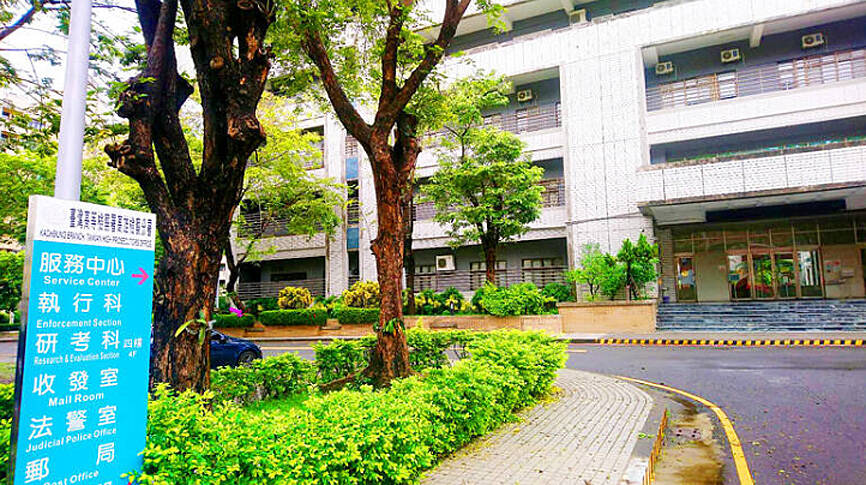Three Taiwanese affiliated with the China Unification Promotion Party (CUPP) were yesterday charged with developing a spy network to infiltrate the Taiwanese military, contravening the National Security Act (國家安全法).
The Kaohsiung branch of the High Prosecutors’ Office charged Wen Lung (溫瓏), who runs a business in China, along with two retired Taiwanese military officers, Chu Hsin-yu (朱新瑜) and Chiang Chiung-lin (江瓊麟), both members of the CUPP’s Shih Chung chapter.
Wen started a business in China in 2016 to import agricultural technology and specialty crops from Taiwan for the Chinese market, prosecutors said, alleging that he was recruited by Beijing’s United Front Work Department to target Taiwanese.

Photo: Pao Chien-hsin, Taipei Times
Wen had made several media appearances touting the benefits of doing business in China, and urging Taiwanese to work there, the indictment showed.
He got to know Chiang and Chu and allegedly invited them on all-expenses-paid trips to China, it said.
Wen arranged for the two retired military officers to meet with “united front” officials, and the duo allegedly promised to use their personal connections and networks in Taiwan to recruit military personnel as spies and procure confidential materials to pass on to their Chinese handlers, prosecutors said.
The trio allegedly worked to form a spy network in Taiwan including both retired and active Taiwan military personnel, prosecutors said.
Law enforcement officers in May raided residences in Kaohsiung and other cities to gather evidence and summon the trio for questioning.
The trio have been charged under Article 2 of the National Security Act, which prohibits a person from working for China, Hong Kong, Macau or foreign hostile forces to “fund, direct or develop an organization,” prosecutors said.
The act also prohibits “spying on or collecting confidential documents, messages, articles or electromagnetic records that are for official use.”
During questioning, the trio admitted to having met with united front officials and other Chinese intelligence officers, prosecutors said.

‘DENIAL DEFENSE’: The US would increase its military presence with uncrewed ships, and submarines, while boosting defense in the Indo-Pacific, a Pete Hegseth memo said The US is reorienting its military strategy to focus primarily on deterring a potential Chinese invasion of Taiwan, a memo signed by US Secretary of Defense Pete Hegseth showed. The memo also called on Taiwan to increase its defense spending. The document, known as the “Interim National Defense Strategic Guidance,” was distributed this month and detailed the national defense plans of US President Donald Trump’s administration, an article in the Washington Post said on Saturday. It outlines how the US can prepare for a potential war with China and defend itself from threats in the “near abroad,” including Greenland and the Panama

A magnitude 4.9 earthquake struck off Tainan at 11:47am today, the Central Weather Administration (CWA) said. The hypocenter was 32.3km northeast of Tainan City Hall at a depth of 7.3km, CWA data showed. The intensity of the quake, which gauges the actual effect of a seismic event, measured 4 in Tainan and Chiayi County on Taiwan's seven-tier intensity scale, the data showed. The quake had an intensity of 3 in Chiayi City and County, and Yunlin County, while it was measured as 2 in Kaohsiung, Nantou County, Changhua County, Taitung County and offshore Penghu County, the data showed. There were no immediate reports of

The Chinese Nationalist Party (KMT) is maintaining close ties with Beijing, the Democratic Progressive Party (DPP) said yesterday, hours after a new round of Chinese military drills in the Taiwan Strait began. Political parties in a democracy have a responsibility to be loyal to the nation and defend its sovereignty, DPP spokesman Justin Wu (吳崢) told a news conference in Taipei. His comments came hours after Beijing announced via Chinese state media that the Chinese People’s Liberation Army’s Eastern Theater Command was holding large-scale drills simulating a multi-pronged attack on Taiwan. Contrary to the KMT’s claims that it is staunchly anti-communist, KMT Deputy

RESPONSE: The government would investigate incidents of Taiwanese entertainers in China promoting CCP propaganda online in contravention of the law, the source said Taiwanese entertainers living in China who are found to have contravened cross-strait regulations or collaborated with the Chinese Communist Party (CCP) could be subject to fines, a source said on Sunday. Several Taiwanese entertainers have posted on the social media platform Sina Weibo saying that Taiwan “must be returned” to China, and sharing news articles from Chinese state media. In response, the Mainland Affairs Council (MAC) has asked the Ministry of Culture to investigate whether the entertainers had contravened any laws, and asked for them to be questioned upon their return to Taiwan, an official familiar with the matter said. To curb repeated